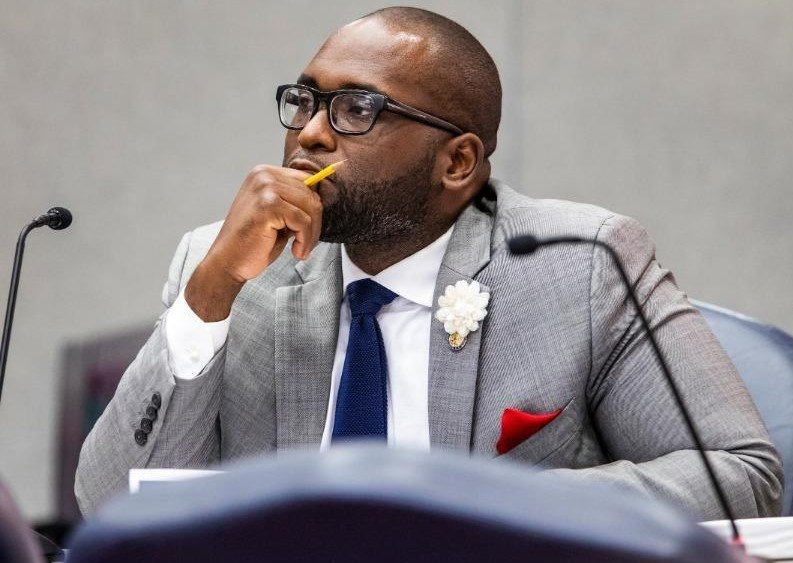
History of communism bills draw questions

By Ryan Dailey
News Service of Florida
Proposals that could lead to instruction on the history of communism in school grades as low as kindergarten have sparked a debate about whether such lessons are appropriate for young students.
Under current state standards, public-school students do not encounter lessons about communism until seventh grade. But the Senate and House are considering bills (SB 1264 and HB 1349) that could lead to changes.
The Republican-controlled Senate Education Pre-K-12 Committee last Tuesday approved the Senate version of the bill, which would create a task force to look at ways to “refine” education about communism, according to the bill sponsor.
The proposed task force, which would be housed at the state Department of Education and be made up of members appointed by the governor, would make recommendations “for curriculum standards and instruction on the history of communism for kindergarten through grade 12.”
Bill sponsor Jay Collins, R-Tampa, described a wide range of subject matter that would be included in the proposed task force’s recommendations.
“It (the bill) goes through, focuses on the history of domestic communist movements, their tactics within the U.S. and abroad, the philosophy and lineage of communism including Marxism, foreign communist movements of the 20th century and the communist socioeconomic policies of Cuba, Venezuela, etc.,” Collins told the committee.
The bill drew skepticism from Democrats, in part because of the prospect of instruction on the history of communism in early grades.
“What does that particular curriculum look like for our kindergarten students?” Sen. Shevrin Jones, D-Miami Gardens, asked.
Collins said the proposal “is not meant as kindergarteners getting curriculum. We’re leaving it broad for the task force to make recommendations on what is age appropriate to utilize the space.”
“I don’t think we’re teaching our kindergarteners anything on that right now, nor should we be,” Collins continued. “I do believe that what we can do is look at what we have going on, how it’s addressed and refine that to make sure that it actually meets the standards that are aligned with our values as a state and this nation.”
Despite the questions, members of the Senate committee unanimously approved the bill
Sen. Rosalind Osgood, D-Fort Lauderdale, said it would bolster history education.
“I believe that all history has value, it is history that gives us our empirical evidence of things that we’ve done well in our best practices, but it also teaches us our lessons learned that we should never repeat,” Osgood said.
The House bill would go further than the Senate version by requiring, according to a House staff analysis, that the “history of communism be included in required instruction to public school students in grades K-12.”
The change would take effect in the 2026-2027 school year.
House bill sponsor James Buchanan, R-Osprey, described it, in part, as an effort to stave off “the normalization” of communism among public-school students.
“I think it’s important, especially K (kindergarten) through 12 (12th grade), that we’re resisting the normalization of some of this theoretical conversation around the abstract of communism,” Buchanan said.
Under the House bill, such instruction would have to be “age appropriate and developmentally appropriate” and include lessons on subject matter such as the “increasing threat of communism in the United States and our allies through the 20th Century” and the history of communism in the U.S.
The House Choice & Innovation Subcommittee a week earlier voted 11-4 to approve the measure.
Like its Senate counterpart, the House bill makes mention of instruction about the “philosophy and lineages” of communism. But the House bill differs from the Senate version by requiring instruction about “cultural Marxism.” The term’s inclusion in the bill sparked questions from Democrats, including Rep. Susan Valdes, D-Tampa.
“Cultural Marxism, isn’t that a very politically charged terminology that’s being used?” Valdes asked.
“I don’t know, is it?” Buchanan replied.
Buchanan also faced a question from Valdes about what instruction about communism would involve for kindergartners. Buchanan pointed to the House bill also calling for creation of a task force.
“I think that’s a big rationale for having the task force, working with the Department of Education, developing that … appropriate curriculum for each age group and grade,” Buchanan said.
Lawmakers in recent years have passed other measures aimed at bolstering instruction about communism.
Starting this year, high-school students in U.S. government classes are required under a new law to receive at least 45 minutes of instruction on “Victims of Communism Day” to graduate.







